Following the reports, treasury secretary for the US, Janet Yellen, announced that the economy is firing on all cylinders, suggesting that the Fed will secure the smooth landing that has been in their sights for some time. The GDP growth is peculiar, Yellen maintained, although not concerning, noting that the job market is in three-plus-year expansion territory that is empowering consumers’ spending but is not so ‘hot’ that wage growth is putting upwards pressure on inflation. She also urged the US population to consider that things such as shelter costs will moderate throughout the year – ultimately meaning that inflation will not take off in a direction that will spook the Fed.
Over in Europe, France faces a busy few months as Macron’s administration receives both criticism and pressure from the Far Right and Republicans over its current public deficit. Recent forecasts reported by the International Monetary Fund indicate that the country’s deficit will remain above 4% until 2029, with Macron’s government declaring the possibility of a financial shortfall of 5.1% this year – something that may form the basis of a future no confidence vote with respect to the Prime Minister. Despite the region’s credit rating being left unchanged by agencies Moody’s and Fitch last week, we anticipate some short-term noise in markets over the coming weeks while investors distinguish what is actually a tangible concern to the economy and what is not.
CPI data was released last week for Japan, with the core reading coming in below expectations at an increase of 1.6% in April from last year, in contrast to a 2.4% gain in March this year. The slower increase this month is thought to be in part attributable to the fact that the Tokyo Met government decided to make some tuition free for students. Following the ending of their 17 year stretch of negative rates last month, policymakers were perhaps waiting to see the Fed’s next move when they also decided to keep rates at -0.1% to 0.1% on Friday. In response to their keeping of rates unchanged, we saw the Yen slide 160 to the dollar before it rebounded in anticipation of subsequent intervention by policymakers.
Still to come this week we have the Fed’s latest interest rate decision (which is expected to see policymakers holding rates steady), China’s PMI data and Eurozone consumer confidence, GDP & inflation data, earnings season data from the likes of Amazon, Apple, HSBC and Samsung & Q1 earnings for Chinese mega banks.
Nicola Tune, Portfolio Specialist



